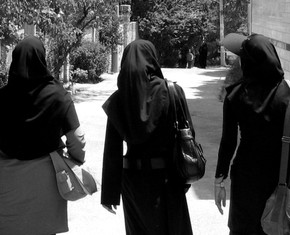The views expressed in our content reflect individual perspectives and do not represent the authoritative views of the Baha'i Faith.
Do you love your country? Most of us do. The Baha’i teachings, though, ask us to expand our love of country to a wider scope—the love of the world.
Baha’u’llah, the prophet and founder of the Baha’i Faith, wrote:
Of one tree are all ye the fruit, and of one bough the leaves. Let not man glory in this that he loveth his country, let him rather glory in this that he loveth his kind. – Tablets of Baha’u’llah, pp. 127-128.
That wider loyalty to humanity itself—to the world rather than a particular nation—defines much of what it means to be a Baha’i, and to work for “… a world community in which the fury of a capricious and militant nationalism will have been transmuted into an abiding consciousness of world citizenship.” – Shoghi Effendi, The World Order of Baha’u’llah, p. 40.
Baha’is believe in the oneness of the world and its peoples, its religions and its countries. While the world today divides itself into more than 200 nations, the Baha’i teachings ask those nations to cede their sovereignty and their option of making war, putting those powers into the hands of a democratically-elected world parliament that reflects the reality of our planet’s organic oneness. In fact, the Baha’i writings say that purpose—world unity—has driven the revelation of every religion:
For a single purpose were the Prophets, each and all, sent down to earth; for this was Christ made manifest, for this did Baha’u’llah raise up the call of the Lord: that the world of man should become the world of God, this nether realm the Kingdom, this darkness light, this satanic wickedness all the virtues of heaven—and unity, fellowship and love be won for the whole human race, that the organic unity should reappear and the bases of discord be destroyed and life everlasting and grace everlasting become the harvest of mankind. – Abdu’l-Baha, Selections from the Writings of Abdu’l-Baha, p. 30.
So are Baha’is patriotic? Yes, they are—Baha’is love their countries and obey their governments. But Baha’is also extend their patriotism to the Earth itself, believing that, as Baha’u’llah said, “The earth is but one country, and mankind its citizens.” – Tablets of Baha’u’llah, p. 167. Baha’is also strongly believe that peace cannot come to the world without global unity, and that only the compelling power of the word of God can make true unity possible:
The well-being of mankind, its peace and security, are unattainable unless and until its unity is firmly established. This unity can never be achieved so long as the counsels which the Pen of the Most High hath revealed are suffered to pass unheeded. – Baha’u’llah, Gleanings from the Writings of Baha’u’llah, p. 286.
Do those two loyalties—the patriotic love of country and the altruistic, more expansive love of humanity and our planet—pose an inherent conflict for Baha’is? No, said Shoghi Effendi, the Guardian of the Baha’i Faith:
The love of one’s country, instilled and stressed by the teaching of Islam, as “an element of the Faith of God,” has not, through this declaration, this clarion-call of Baha’u’llah, been either condemned or disparaged. It should not, indeed it cannot, be construed as a repudiation, or regarded in the light of a censure, pronounced against a sane and intelligent patriotism, nor does it seek to undermine the allegiance and loyalty of any individual to his country, nor does it conflict with the legitimate aspirations, rights, and duties of any individual state or nation. All it does imply and proclaim is the insufficiency of patriotism, in view of the fundamental changes effected in the economic life of society and the interdependence of the nations, and as the consequence of the contraction of the world, through the revolution in the means of transportation and communication—conditions that did not and could not exist either in the days of Jesus Christ or of Muhammad. It calls for a wider loyalty, which should not, and indeed does not, conflict with lesser loyalties. It instills a love which, in view of its scope, must include and not exclude the love of one’s own country. It lays, through this loyalty which it inspires, and this love which it infuses, the only foundation on which the concept of world citizenship can thrive, and the structure of world unification can rest. It does insist, however, on the subordination of national considerations and particularistic interests to the imperative and paramount claims of humanity as a whole, inasmuch as in a world of interdependent nations and peoples the advantage of the part is best to be reached by the advantage of the whole. –Shoghi Effendi, The Promised Day is Come, p. 121-122.
Now there’s a fascinating concept: “… the advantage of the part is best to be reached by the advantage of the whole.” Think about it, and consider its ramifications.
In many ways, modern 21st-Century society still operates on 19th-Century Darwinian principles—the survival of the fittest, competition and the resulting separation of people into a few winners and many losers. But the Baha’i teachings take a very different approach. Oneness and unity, the central Baha’i principles, require an entirely new way of looking at the world’s issues—one that first considers and privileges the advantage of the whole over the advantage of any individuals, groups or particular nations.
Only that holistic approach, the Baha’i teachings promise, will bring us solidarity, security and peace:
The world is, in truth, moving on towards its destiny. The interdependence of the peoples and nations of the earth, whatever the leaders of the divisive forces of the world may say or do, is already an accomplished fact. Its unity in the economic sphere is now understood and recognized. The welfare of the part means the welfare of the whole, and the distress of the part brings distress to the whole. The Revelation of Baha’u’llah has, in His own words, “lent a fresh impulse and set a new direction” to this vast process now operating in the world … one body, single, organically united, and indivisible. Ibid., p. 122.
















Comments
Sign in or create an account
Continue with Googleor